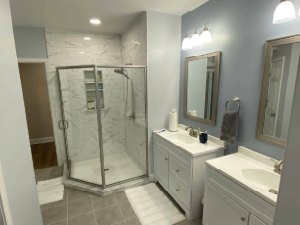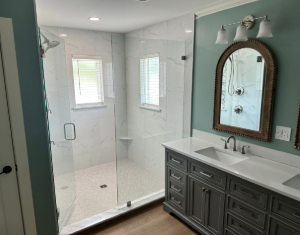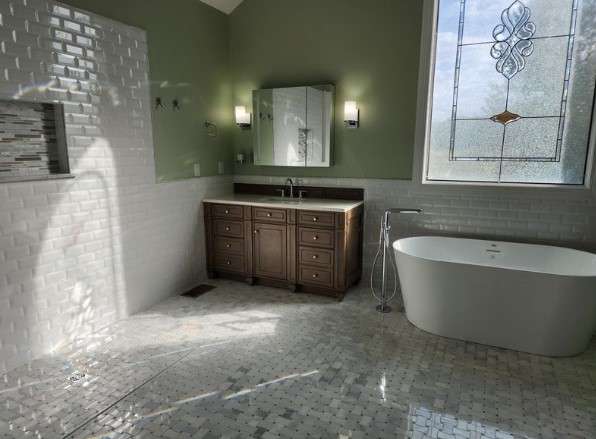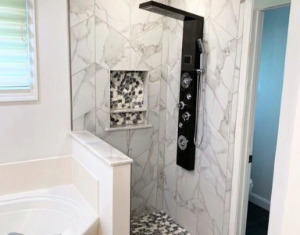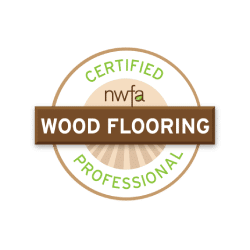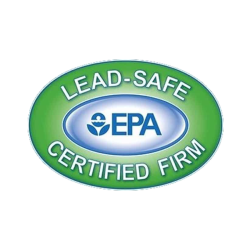Choosing the best flooring for your rental property first requires you ask yourself a few basic questions. Are you leasing out a high-end house in a ritzy part of town or are you renting an efficiency via Section 8 (or, as is most often the case, is your property somewhere in the middle of the market?) Will you allow small pets, large pets, exotic pets or no pets at all?
How about your future plans for the property: Do you want to continually reinvest in it or “set it and forget it”? Will you be selling any time soon, or passing the real estate on to your children?
Once you have a clear idea of what kind of property you’re working with, what stratum of renter you’ll likely be renting to, and how involved you want to be with the property moving forward, choosing the type of floor to install should come relatively easily.
The Lap of Luxury
If you’ll be renting out a lavish home in a desirable part of town to high-income tenants, potential lessees will more than likely expect premium accouterments: stainless steel faucets, brushed metal fixtures, and natural stone tile.
Although natural stone tile is typically the most expensive flooring option, several factors offset the added expense. For one, you can charge a higher monthly rent—sometimes hundreds of dollars more per month. In time, not only will the stone floor pay for itself, it will increase the lifetime return on investment in the property.
Secondly, stone floors will last longer than practically any other flooring option on the market, thus saving you tons of money on future renovations. Since they’re so durable, they also make great floors for pet-friendly rentals, since cats and pups are unlikely to damage them. This, too, can increase your revenue with added monthly pet fees and one-time nonrefundable pet deposits.
If you do decide to go with stone tile floors, consider also upgrading your countertops to match. The more premium features you add to your rental property now, the greater that property’s long-term earning potential becomes.
LVP Flooring: Where Form Meets Function
Luxury Vinyl Plank flooring has exploded in popularity over the last decade or so, and for good reason. No longer just a “budget” option, LVP is among the most durable flooring products available, and high-quality manufacturing techniques have created panels that compete with natural hardwood and tile for an elegant look.
It’s just about perfect in every way, especially for rental properties. It’s scratch resistant, so pets won’t tear it up. It’s pliable, so it won’t crack or break. And it looks fantastic, especially in listing photos.
If you want to create a high-end feel without breaking the bank—with a floor that’s built to last—LVP may be the sweet spot you’ve been looking for.
It’s also where you’ll look if you’re trying to get the job done as cheaply as possible and you’re not worried about longevity: Some of the least expensive (but also lowest quality) flooring options are vinyl plank (the low end doesn’t get to claim the word “luxury”). This may work if either you plan on gutting and replacing your rental property’s interior every few years, or if you’re planning to sell soon.
No Hard(wood) Feelings
One of the riskier decisions when replacing the floor in a rental property is choosing natural hardwood. Nothing matches the sense of comfort and elegance hardwood floors inspire, but that luxury comes at a cost: Hardwood floors are among the easiest to damage and most costly to fix.
For that reason, true hardwood is only advisable in very limited rental settings. It works well in properties primarily rented to older adults without children, like in a patio home, for example. It does not, however, mix well with large pets, so it’s advisable to restrict tenants to either small pets or no pets at all.
Hardwood also requires more maintenance than other types of flooring, especially if it’s abused. Although it will ultimately last for generations, it will eventually require resealing and perhaps even sanding, if it takes enough damage.
Another consideration: If your rentals are part of a multi-unit property, hardwood is probably the noisiest flooring option. This can be especially unpleasant if your units are stacked atop one another.
Carpet: A Choice That ‘Bombs’
If there’s one regret we hear more than anything else, it’s when a property owner makes the mistake of leaving or installing carpet in a rental unit. Carpets soak up pet accidents, they stain, and they’re a veritable sponge for diseases and toxins.
No other type of floor requires as much maintenance (at the very least, carpets need to be professionally cleaned in between tenants) or must be replaced as often as carpet. The Internet is full of pages recommending how to cover and hide ugly, dirty carpets that landlords refuse to clean or tear out.
There’s practically no benefit to carpeting your rental properties. With so many other affordable, low-maintenance options available, we recommend against carpets entirely.
Still can’t decide what kind of flooring will make your rental stand out? Call or email Flooring Masters & Professional Remodelers today for a free consultation. We know you only want the best in flooring. That’s why it’s important to hire the best in the business, and at Flooring Masters & Professional Remodelers, we can guarantee you that’s us.
Flooring Masters & Professional Remodelers have been flooring and remodeling Kentuckiana for over 30 years. Our certified installers have the ingenuity and know-how to assist you in choosing the perfect floors for your home. Don’t take matters into your own hands—let us guide your next project.

